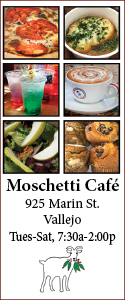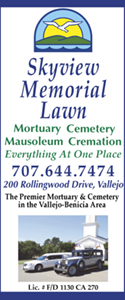The Savory Truffle
Celebrate 10 years of the Napa Truffle Festival in January
By Matt Larson
When the American Truffle Company™ (ATC) first launched the Napa Truffle Festival in 2010, many people expected it to be all about chocolate! Those people were mistaken.
The word “truffle” can indeed refer to a type of confection, but these days that term is becoming more recognized for its alternate meaning: “truffle” also refers to a type of fungi, a mushroom variant that is used in many different foods worldwide including pasta, risotto, eggs, cheese and more.
Unlike the common mushrooms that we’re used to seeing in soups, salads, and unexpectedly in the backyard, truffles grow underground on the roots of certain trees—mostly oak and hazelnut—and carry a powerful taste and aroma.
Truffles are tremendously difficult to cultivate and take years of preparation to even start growing (about as many years as it takes to plant a vineyard and grow grapes).
In fact, it wasn’t until December of 2018 that the first substantial harvest—“resulting from the application of rigorous and systematic scientific methodology that is consistent, reproducible and reliable,” according to ATC—occurred at the Otellini Truffle Orchard in Sonoma County.
ATC managed and inoculated Otellini’s trees with the black Périgord truffle fungus, which is known as “the most expensive and sought-after black truffle in the world, historically fetching up to $1,200 per pound.”
In 2012, 60 Minutes deemed truffles to be the most expensive food in the world, as at the time, white truffles were selling for as much as $3,600 a pound. Fortunately, it only takes ounces, not pounds, for truffles to make an impact on your meal.
Truffles are not native to North America, so ATC’s achievement at Otellini is quite historic. They cultivate both winter Périgord and summer Burgundy, the two most popular black truffles in the world. They’ve yet to crack the code on white truffles.
Dr. Paul Thomas, Chief Scientist for the American Truffle Company™, has succeeded in cultivating truffles in Macedonia, Wales, and Spain; and he works with growers in Australia, which is one of the world’s largest black truffle distributors.
In other words, likely every truffle-infused culinary creation that you’ve ever had in America came from truffles grown in other countries. ATC is on the brink of changing that reality and wants to inspire others to do the same.
Dr. Thomas, along with Managing Director Robert Chang, created the Napa Truffle Festival in 2010 to enlighten and inspire current and future truffle growers, and to increase truffle awareness to the general public.
Tickets are on sale now for the 10th Annual Napa Truffle Festival, held January 17-20, 2020.
With the exception of Oregon, where you’ll find a truffle festival specific to Oregon-grown truffles, the Napa Truffle Festival is the only event of its kind nationwide.
What to expect? Well, truffles, naturally, and again, not the chocolate kind!
“The whole point of the Truffle Festival is to educate people on what truffles are,” ATC’s Marketing and PR Consultant Kathleen Iudice said.
“We have all types of interactive programs where people can smell and taste different truffle species,” she continued. Guests can also attend winery-hosted lunches, truffle orchard tours, dog training demos featuring professional “truffle dogs,” and much more.
Tasting the truffles is, of course, one of the biggest draws for the event, and the festival presents plenty of opportunities to tickle your taste buds.
Each year, two different wineries host a winery truffle lunch.
For Saturday’s “Dig Truffles?” program, you can enjoy A Foodie’s Guide at CIA Copia and learn all about selecting, storing, and preparing truffles from Michelin-starred Chef Ken Frank of La Toque. Following the program is a tour and lunch at Del Dotto Vineyards finishing with a truffle orchard tour/dog training demo at Robert Sinskey Vineyards.
The lunch on Saturday is to be prepared by not one, but three amazing chefs, including Ken Frank, Del Dotto’s Executive Chef Joshua Schwartz, and Guest Chef Juan José Cuevas from San Juan’s 1919 Restaurant.
Sunday’s lunch includes a cooking demo at Raymond Vineyards presented by Master Chef Michael Smith of Farina in Kansas City. After the demonstration, you get to try his culinary creations yourself—paired with Raymond Vineyards’ signature wines.
Unlike other festivals that require an overall pass, tickets can be purchased on a per-event basis, so you only pay for the parts of the festival that appeal to you, including the signature Truffles & Wine Dinner at La Toque.
If you’re in search of adventure, we recommend attending one of the festival’s Wild Mushroom Forays.
Forage out into Angwin’s Las Posadas State Forest with truffle experts, including ATC’s Dr. Paul Thomas himself. Learn about exotic mushrooms and see them in their native habitats.
One of the most popular events of the festival, and also one of the most affordable, is the Truffle Festival Marketplace at Oxbow Public Market on closing day, Monday, January 20th (Martin Luther King, Jr. Day) from 11 a.m. to 3 p.m.
“The marketplace is very popular,” Kathleen said. “All of the merchants participate in the festival, either by presenting a truffle dish or selling some sort of truffle-related item.”
The festival marketplace on this day is open to the public. “This is an opportunity for people to come and just try things à la carte,” Kathleen added. “Buy their own fresh truffles, meet the cute truffle dogs (petting allowed), attend a couple of cooking demos…”
Keep in mind that none of the truffles you’ll be consuming at the festival will be grown locally, as despite the milestone harvest in Sonoma last year, ATC has yet to harvest anything locally on a commercial scale.
“All the Périgord black truffles come from France or Italy,” Kathleen stated. “Truffles have a very short shelf life, so we bring them in Thursday night, disperse them to the chefs, to the Oxbow merchants, and to anyone who’s going to be cooking with them, and sell them out by the end of the festival.”
If you happen to purchase some truffles at the festival or the marketplace, it’s recommended to eat them within one week.
Kathleen estimated that within about the next five years ATC would be able to harvest locally to augment the truffles brought in for the festival. The first truffle orchard that ATC planted was in Napa in 2010, and growing them in a new habitat has not been easy, but the future is looking promising for California truffles.
The more people working toward growing truffles, the better, as together they can share their successes and learn from each other about the best practices for a successful truffle harvest.
“For truffle cultivators, this festival provides a great opportunity to network,” Kathleen said. “It took us 10 years to get here, and it’s going well!”
So come be part of California’s culinary history and attend the 10th Annual Napa Truffle Festival. January 17-20, 2020. Events do sell out, so get your tickets now at napatrufflefestival.com. You can also call them with general questions at (888) 753-9378. For additional information about the American Truffle Company™, go to americantruffle.com.
The American Truffle Company™ is now cultivating truffle orchards nationwide, from here in Napa all the way to New Jersey, as well as in 25 countries that span four continents. If you’ve ever hoped to expand your knowledge of the mystical magical truffle, ATC is the place to go.
 Larson is an actor/comedian/director from Vallejo who lives a double life between the Bay and LA. When he’s not writing for Local Happenings Magazine he could be editing a short film or working on his next rap album—who knows!
Larson is an actor/comedian/director from Vallejo who lives a double life between the Bay and LA. When he’s not writing for Local Happenings Magazine he could be editing a short film or working on his next rap album—who knows!
Keep up with all things Larson at www.MarsLegstrong.com.”





















































